I’m kinda high on what the Charlotte Bobcats did with Ben Gordon.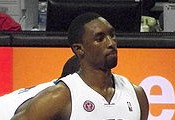
The Bobcats waived Gordon on Sunday, preventing him from appearing in the postseason should he sign with another team. While they may have alienated his agent – not a trifle thing in the business world of the NBA – two things should be pointed out.
1. When teams waive or buy out players at this time of the season, they are essentially establishing a price they are willing to pay to that player to not play for them.
2. In this case, the Bobcats made it impossible for Gordon to come back to haunt them in the playoffs.
There are many reasons why teams want to waive or buy out players at this time of the season. They want roster flexibility. They want to give minutes to a younger player. They want to save money. They want a bad apple removed from the bunch.
But it’s hard to understand why teams are in such a hurry to accommodate these players by waiving them before March 1 and giving them a chance to latch on elsewhere and possibly play in the postseason. It seems it’s almost done with a sense of obligation.
Why give another team – a team you might be battling for a postseason berth or playoff position – a chance to get better? And if you are out of the playoff race, why impact it by making a quality player available to a team headed to the postseason?
The player already is getting a paycheck for a no-show job and another check for a considerably better new job. Does he really need the opportunity for increased exposure and yet another check that the postseason provides?
The next time a player wants to escape a bad team and try to collect a playoff share, his GM should simply say, “We’ll be happy to discuss a buyout with you. On March 2nd.”
Having said that, here are the winners and losers of Buyout Season, a.k.a. February Free Agency.
WINNERS
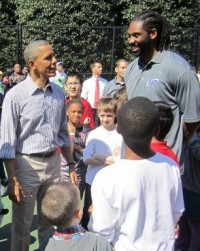
 WIZARDS: They went off the reservation and signed Drew Gooden, an amnesty casualty last summer whom everyone seemed to forget about despite his career averages of 11.8 points and 7.6 rebounds. Gooden won’t put up those numbers for the Wizards, but his presence does alleviate some immediate depth issues with Nene (out until mid-April) and Kevin Seraphin (knee) on the shelf. The third seed is not out of the realm of possibility for the Wizards, although they could finish fifth and still have homecourt advantage in the first round if they can catch Toronto. What is out of the realm of possibility is missing the playoffs, at least in the mind of owner Ted Leonsis. “Our goals have not changed in any way,” he said after Nene went down.
WIZARDS: They went off the reservation and signed Drew Gooden, an amnesty casualty last summer whom everyone seemed to forget about despite his career averages of 11.8 points and 7.6 rebounds. Gooden won’t put up those numbers for the Wizards, but his presence does alleviate some immediate depth issues with Nene (out until mid-April) and Kevin Seraphin (knee) on the shelf. The third seed is not out of the realm of possibility for the Wizards, although they could finish fifth and still have homecourt advantage in the first round if they can catch Toronto. What is out of the realm of possibility is missing the playoffs, at least in the mind of owner Ted Leonsis. “Our goals have not changed in any way,” he said after Nene went down.
 GRIZZLIES: They’ve done well with their makeshift moves. James Johnson was a great find and Courtney Lee has been a steal. Now they have added Beno Udrih, who provides veteran insurance should virtually indispensable Mike Conley get hurt again. And as good as Nick Calathes was in Conley’s absence, having a rookie run the show in the postseason is an occasionally terrifying thought. Of course, they do have to get in first.
GRIZZLIES: They’ve done well with their makeshift moves. James Johnson was a great find and Courtney Lee has been a steal. Now they have added Beno Udrih, who provides veteran insurance should virtually indispensable Mike Conley get hurt again. And as good as Nick Calathes was in Conley’s absence, having a rookie run the show in the postseason is an occasionally terrifying thought. Of course, they do have to get in first.
 BULLS: After Derrick Rose got hurt and Luol Deng was traded, a funny thing happened on the way to tanking the season: The Bulls became dangerous again. GM Gar Forman deserves a little credit not giving away the season while landing a first-round pick, getting out of tax territory, plucking D.J. Augustin off the scrap heap and now signing Jimmer Fredette, who could be nothing – or could be a reincarnation of Steve Kerr. The fans certainly felt it will be a latter as they gave Fredette a huge ovation upon his debut Sunday. “They play hard every single night and they play for each other and they play the right way,” Fredette said, obviously sending a message back to Sacramento.
BULLS: After Derrick Rose got hurt and Luol Deng was traded, a funny thing happened on the way to tanking the season: The Bulls became dangerous again. GM Gar Forman deserves a little credit not giving away the season while landing a first-round pick, getting out of tax territory, plucking D.J. Augustin off the scrap heap and now signing Jimmer Fredette, who could be nothing – or could be a reincarnation of Steve Kerr. The fans certainly felt it will be a latter as they gave Fredette a huge ovation upon his debut Sunday. “They play hard every single night and they play for each other and they play the right way,” Fredette said, obviously sending a message back to Sacramento.
 THUNDER: It would be nice if owner Clay Bennett loosened the purse strings just a little bit for GM Sam Presti, who had almost $9 million in trade exceptions but instead had to hit the Job Lot and come home with a nice bargain. With Kendrick Perkins (a) currently hurt and (b) remarkably ineffective when healthy, Caron Butler is a nice fit in a small lineup with Serge Ibaka at the 5 and Kevin Durant at the 4, especially now with Thabo Sefolosha
THUNDER: It would be nice if owner Clay Bennett loosened the purse strings just a little bit for GM Sam Presti, who had almost $9 million in trade exceptions but instead had to hit the Job Lot and come home with a nice bargain. With Kendrick Perkins (a) currently hurt and (b) remarkably ineffective when healthy, Caron Butler is a nice fit in a small lineup with Serge Ibaka at the 5 and Kevin Durant at the 4, especially now with Thabo Sefolosha 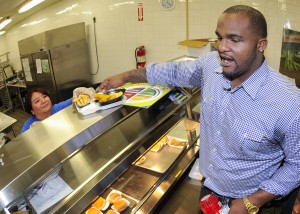 (calf) out four weeks. With 47 playoff games under his belt, Butler won’t wilt under the glare of the postseason the way Jeremy Lamb and Steven Adams likely will. A good addition.
(calf) out four weeks. With 47 playoff games under his belt, Butler won’t wilt under the glare of the postseason the way Jeremy Lamb and Steven Adams likely will. A good addition.
 CLIPPERS: At the trading deadline, they dumped Antawn Jamison and Byron Mullens – who had played a combined 11 minutes in February – and replaced them with Glen Davis and Danny Granger, arguably the two best talents on the buyout market. What this proves is that the idea of playing for Doc Rivers and with Chris Paul is somewhat intoxicating. When the Clippers get healthy – and they’re not right now – you will need sonar to measure their depth. Davis and his 69 career playoff games fill a glaring need – a backup big who can score – and Granger has to prove his career has another chapter. Forget for a minute what Davis and Granger can provide. What Rivers and GM Gary Sacks have done is assure they won’t be providing it for another team.
CLIPPERS: At the trading deadline, they dumped Antawn Jamison and Byron Mullens – who had played a combined 11 minutes in February – and replaced them with Glen Davis and Danny Granger, arguably the two best talents on the buyout market. What this proves is that the idea of playing for Doc Rivers and with Chris Paul is somewhat intoxicating. When the Clippers get healthy – and they’re not right now – you will need sonar to measure their depth. Davis and his 69 career playoff games fill a glaring need – a backup big who can score – and Granger has to prove his career has another chapter. Forget for a minute what Davis and Granger can provide. What Rivers and GM Gary Sacks have done is assure they won’t be providing it for another team.
LOSERS
 HAWKS: They have lost 11 of 12 since Feb. 1 – beating only the hapless Knicks – and the only reason they still have a four-game lead for the East’s final playoff spot is because no one else appears to want it. With Al Horford out for the season, Pero Antic’s two to four weeks out becoming six and Paul Millsap now on the shelf, they addressed their
HAWKS: They have lost 11 of 12 since Feb. 1 – beating only the hapless Knicks – and the only reason they still have a four-game lead for the East’s final playoff spot is because no one else appears to want it. With Al Horford out for the season, Pero Antic’s two to four weeks out becoming six and Paul Millsap now on the shelf, they addressed their 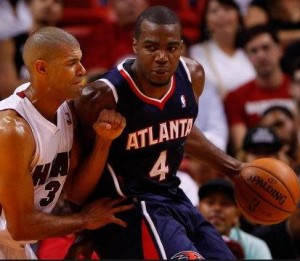 frontcourt chasm with Mike Muscala. Really? Hey, Danny Ferry, have a sandwich. Drink a glass of milk. Do some bleepin’ thing. Don’t know how much former Hawk Ivan Johnson would have helped, but he certainly couldn’t have hurt.
frontcourt chasm with Mike Muscala. Really? Hey, Danny Ferry, have a sandwich. Drink a glass of milk. Do some bleepin’ thing. Don’t know how much former Hawk Ivan Johnson would have helped, but he certainly couldn’t have hurt.
 HEAT: It’s hard to say the team with the longest current winning streak is a loser, but the Heat could see Al Jefferson and Joakim Noah before confronting Indiana’s imposing front line in the playoffs. None of those teams will take their bigs off the floor to match Miami’s small lineup, so another frontcourt player would have helped. Instead, Miami went on the scrap heap and signed guard DeAndre Liggins instead of someone like Lou Amundson or Solomon Jones.
HEAT: It’s hard to say the team with the longest current winning streak is a loser, but the Heat could see Al Jefferson and Joakim Noah before confronting Indiana’s imposing front line in the playoffs. None of those teams will take their bigs off the floor to match Miami’s small lineup, so another frontcourt player would have helped. Instead, Miami went on the scrap heap and signed guard DeAndre Liggins instead of someone like Lou Amundson or Solomon Jones.
 KNICKS: They did what a desperate team with an unlimited budget is supposed to do – clear out the dead weight (Metta World Peace and Beno Udrih) and fill those spots with players who can produce and salvage an awful season. This is the team that needed to add Baby Davis and Danny Granger, but instead they added Earl Clark, who plays the same position as Carmelo Anthony, and Shannon Brown, who plays the same position as J.R. Smith, Iman Shumpert and Tim Hardaway Jr. What may have been a greater issue in not getting players that actually fill the gaping holes in their roster is that this team may be so dysfunctional that no one wants to play there.
KNICKS: They did what a desperate team with an unlimited budget is supposed to do – clear out the dead weight (Metta World Peace and Beno Udrih) and fill those spots with players who can produce and salvage an awful season. This is the team that needed to add Baby Davis and Danny Granger, but instead they added Earl Clark, who plays the same position as Carmelo Anthony, and Shannon Brown, who plays the same position as J.R. Smith, Iman Shumpert and Tim Hardaway Jr. What may have been a greater issue in not getting players that actually fill the gaping holes in their roster is that this team may be so dysfunctional that no one wants to play there.
 SUNS: With apologies to all those trying to lose weight, these guys are the biggest losers. Their buyout move was waiving Slava Kravtsov and signing journeyman Shavlik Randolph, one of a handful of players from China. At the
SUNS: With apologies to all those trying to lose weight, these guys are the biggest losers. Their buyout move was waiving Slava Kravtsov and signing journeyman Shavlik Randolph, one of a handful of players from China. At the 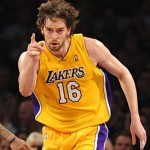 trade deadline, GM Ryan McDonough was sitting on Emeka Okafor’s insured expiring $14 million deal, $4 million in cap room and six first-round picks over the next two years. He could have dealt Okafor and perhaps Indiana’s lottery-protected pick this year to the Lakers for a rental of Pau Gasol but insisted on not surrendering any first-round picks. That decision will haunt the Suns, who aren’t going to hold off Memphis for the West’s final playoff spot.
trade deadline, GM Ryan McDonough was sitting on Emeka Okafor’s insured expiring $14 million deal, $4 million in cap room and six first-round picks over the next two years. He could have dealt Okafor and perhaps Indiana’s lottery-protected pick this year to the Lakers for a rental of Pau Gasol but insisted on not surrendering any first-round picks. That decision will haunt the Suns, who aren’t going to hold off Memphis for the West’s final playoff spot.
TRIVIA: Who was the last Rookie of the Year to play for a winning team? Answer below.
Ferry didn’t sign anybody because he’s tanking. Obviously. He’s a natural born loser, but his inaction this time isn’t because he thinks his roster is great.
Suns have already exceeded expectations whether to make playoffs or not. If they make playoffs, they are good for a couple of rounds max. Great opportunity for developing young players, but no trophy in sight. If they miss playoffs, they get higher pick.
Gasol-for-rent is less valuable than Indiana’s late pick. He is too old, often injured, doesn’t fit Suns pace & indicated he wasn’t willing to re-sign with Suns after this season. He might also disrupt Suns chemistry & eat into younger talents’ playing time. Rookie-scale contracts are valuable commodity under the CBA – for hiring cheap talent or as trade bait for superstar. Worth a lot more than Gasol.
Bernard, thanks for reading but disagree. You still get Gasol’s cap slot, so chasing free agents is unaffected. And the Suns have played their way out of a top five or top six pick; their own pick will be in the 13-17 range, with three other picks in the teens or lower. Do you want four more Archie Goodwins or Kendall Marshalls? I really believe the worst thing that can happen to the Suns this season is that they just miss the playoffs. Now they may get in, and that experience is invaluable. But Gasol would have helped in that regard. As Val Kilmer said in Heat, “It’s worth the stretch.”
I’m thinking that maybe Lakers should be considered losers for not trying harder to either get rid of Gasol or Kaman and Hill at the trade deadline. Now LAL could win a few games (especially if Kobe returns) and get as high as the 8th or 9th pick, besides still being a Luxury Tax team. Lakers were thought to be demanding a quality 2nd round pick in addition to getting another team absorb the salaries of Kaman or Hill.
Lakers could have been on pace to get the best odds for the #2 pick (before Sixers decided to give Bucks a challenge for the worst record).
I agree Jerry, but I was trying not to factor in the trading deadline. was just going off post deadline moves.